(广东专版)2020年高中英语学业水平测试复习基础梳理Unit2 English around the world 课件(20张ppt)新人教版必修1
文档属性
| 名称 | (广东专版)2020年高中英语学业水平测试复习基础梳理Unit2 English around the world 课件(20张ppt)新人教版必修1 | 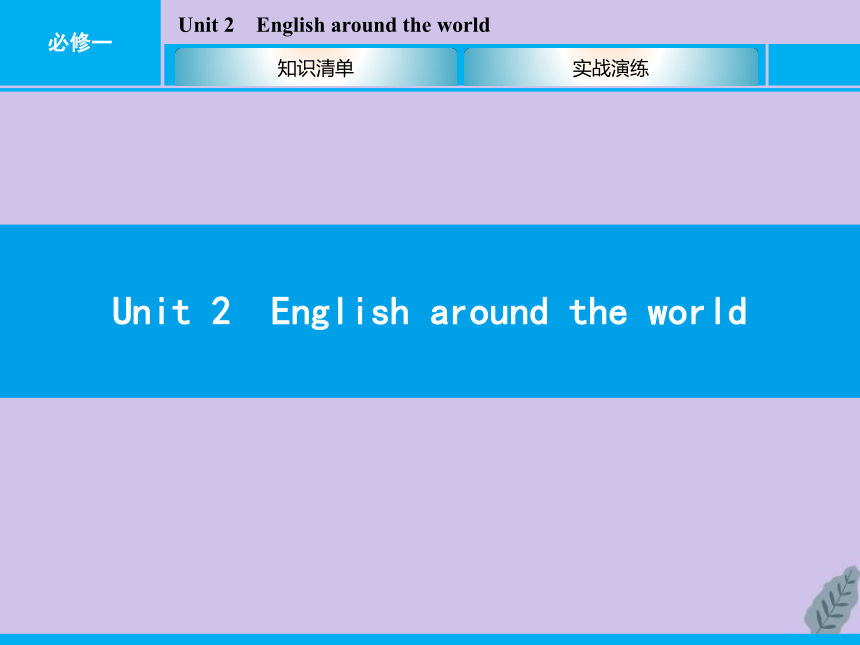 | |
| 格式 | zip | ||
| 文件大小 | 153.8KB | ||
| 资源类型 | 教案 | ||
| 版本资源 | 人教版(新课程标准) | ||
| 科目 | 英语 | ||
| 更新时间 | 2019-11-24 16:09:20 | ||
图片预览

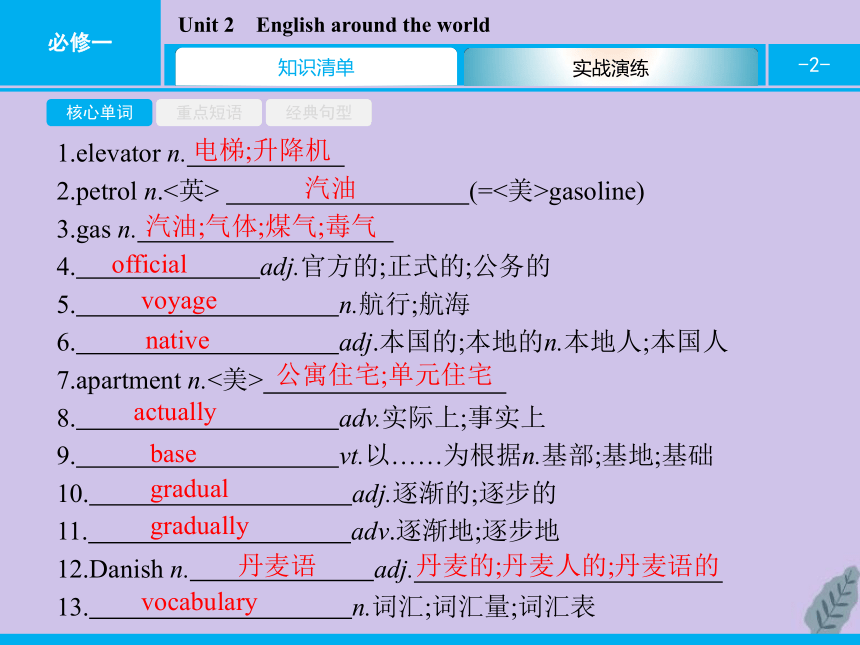
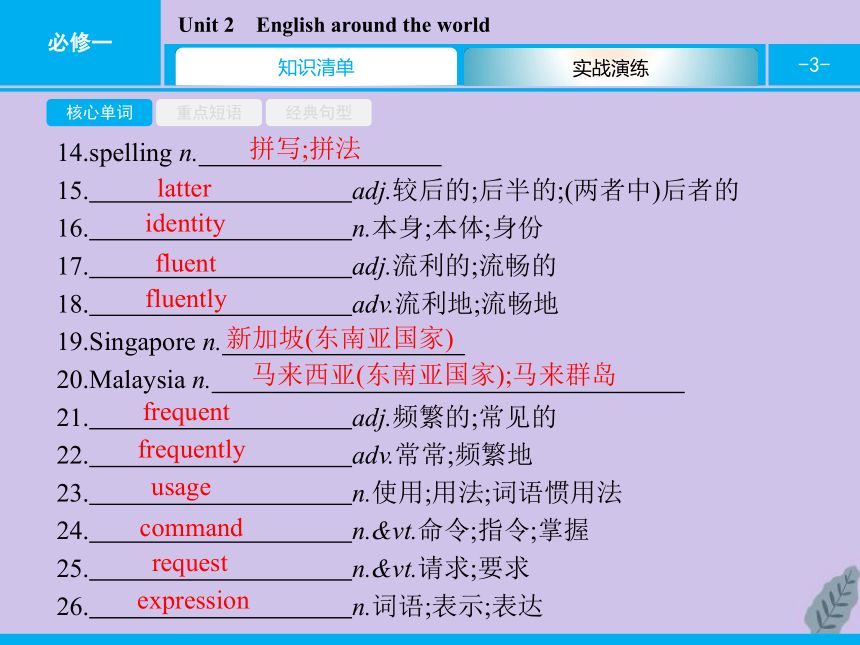
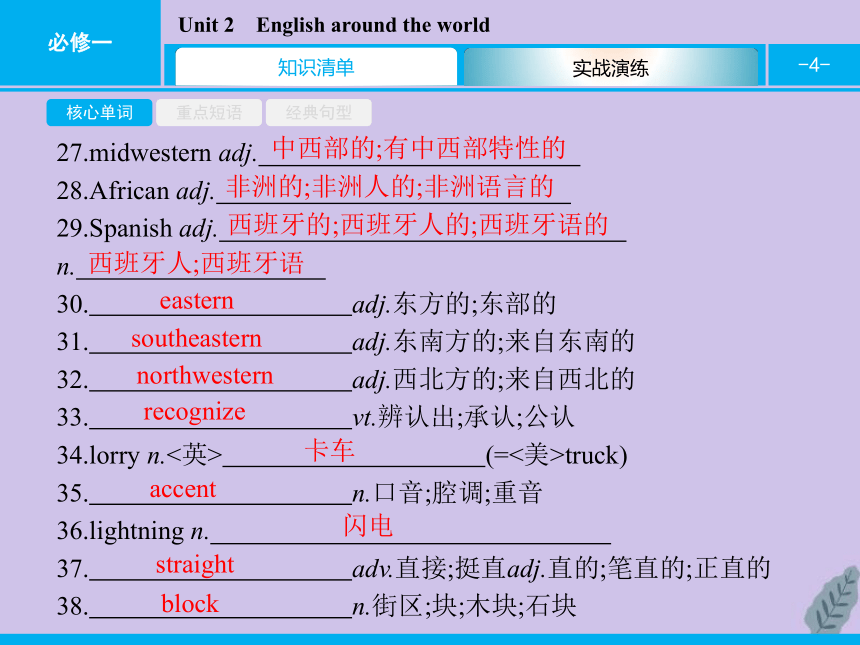
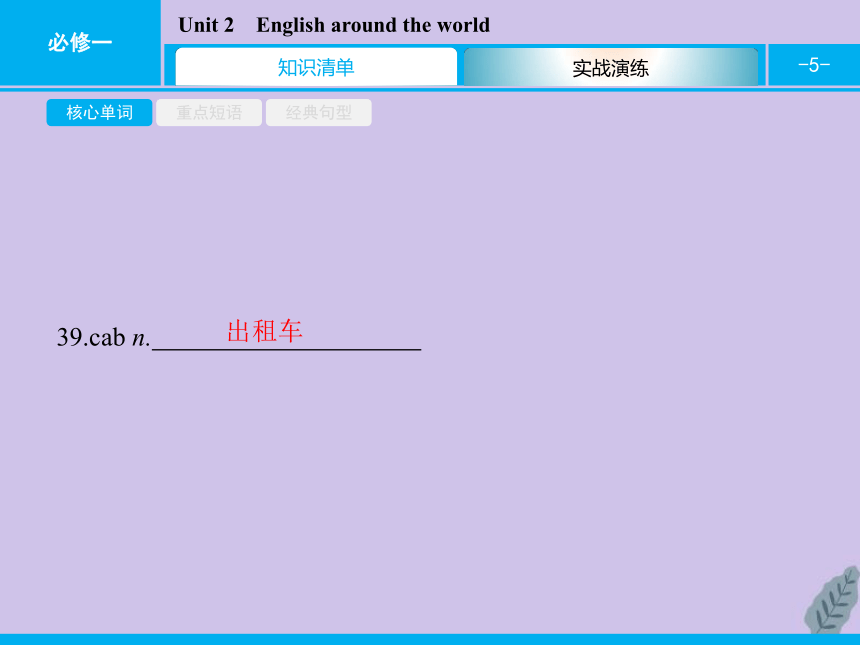
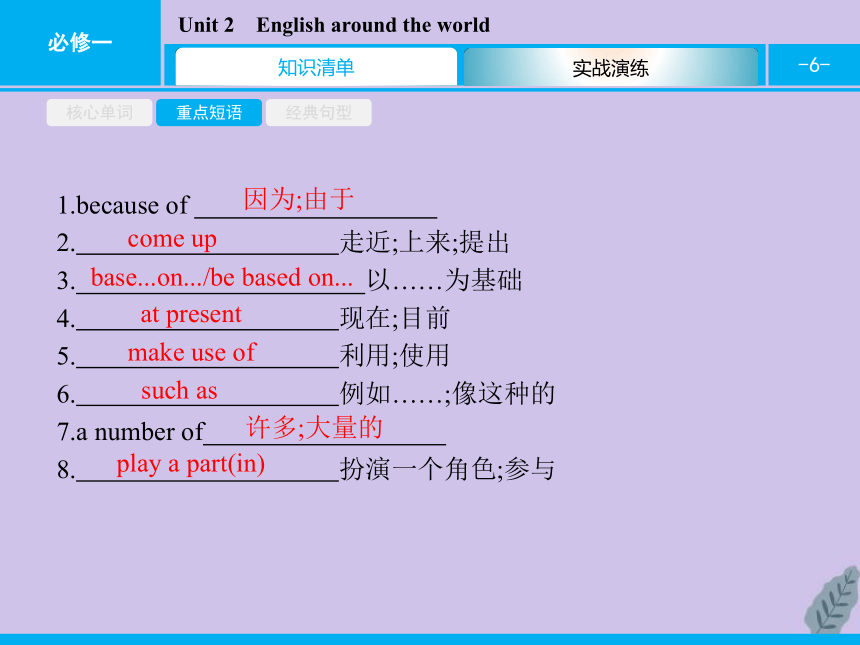
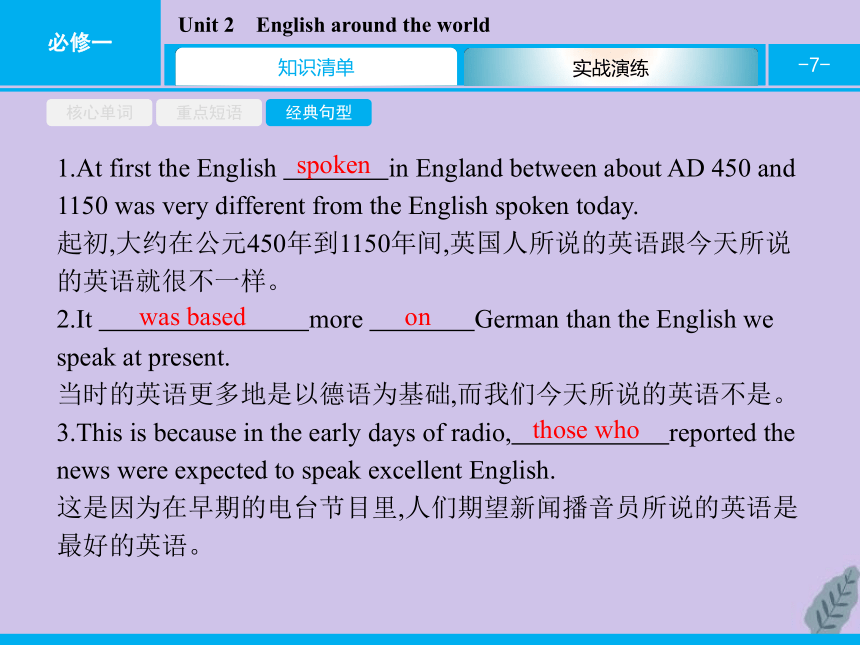

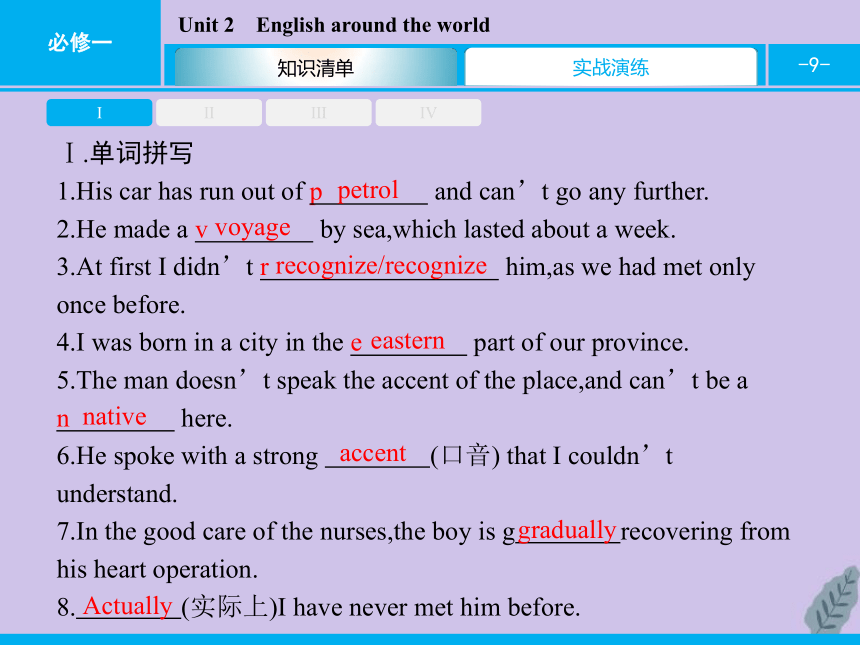
文档简介
(共20张PPT)
Unit 2 English around the world
-null-
核心单词
重点短语
经典句型
1.elevator n. ?
2.petrol n.<英> ?(=<美>gasoline)
3.gas n. ?
4. adj.官方的;正式的;公务的
5. n.航行;航海
6. adj.本国的;本地的n.本地人;本国人
7.apartment n.<美> ?
8. adv.实际上;事实上
9. vt.以……为根据n.基部;基地;基础
10. adj.逐渐的;逐步的
11. adv.逐渐地;逐步地
12.Danish n. adj. ?
13. n.词汇;词汇量;词汇表
电梯;升降机
汽油
汽油;气体;煤气;毒气
official
voyage
native
公寓住宅;单元住宅
actually
base
gradual
gradually
丹麦语
丹麦的;丹麦人的;丹麦语的
vocabulary
-null-
核心单词
重点短语
经典句型
14.spelling n. ?
15. adj.较后的;后半的;(两者中)后者的
16. n.本身;本体;身份
17. adj.流利的;流畅的
18. adv.流利地;流畅地
19.Singapore n. ?
20.Malaysia n. ?
21. adj.频繁的;常见的
22. adv.常常;频繁地
23. n.使用;用法;词语惯用法
24. n.&vt.命令;指令;掌握
25. n.&vt.请求;要求
26. n.词语;表示;表达
拼写;拼法
latter
identity
fluent
fluently
新加坡(东南亚国家)
马来西亚(东南亚国家);马来群岛
frequent
frequently
usage
command
request
expression
-null-
核心单词
重点短语
经典句型
27.midwestern adj. ?
28.African adj. ?
29.Spanish adj. ?
n. ?
30. adj.东方的;东部的
31. adj.东南方的;来自东南的
32. adj.西北方的;来自西北的
33. vt.辨认出;承认;公认
34.lorry n.<英> (=<美>truck)
35. n.口音;腔调;重音
36.lightning n. ?
37. adv.直接;挺直adj.直的;笔直的;正直的
38. n.街区;块;木块;石块
中西部的;有中西部特性的
非洲的;非洲人的;非洲语言的
西班牙的;西班牙人的;西班牙语的
西班牙人;西班牙语
eastern
southeastern
northwestern
recognize
卡车
accent
闪电
straight
block
-null-
核心单词
重点短语
经典句型
39.cab n. ?
出租车
-null-
核心单词
重点短语
经典句型
1.because of ?
2. 走近;上来;提出
3. 以……为基础
4. 现在;目前
5. 利用;使用
6. 例如……;像这种的
7.a number of ?
8. 扮演一个角色;参与?
因为;由于
come up
base...on.../be based on...
at present
make use of
such as
许多;大量的
play a part(in)
-null-
核心单词
重点短语
经典句型
1.At first the English in England between about AD 450 and 1150 was very different from the English spoken today.?
起初,大约在公元450年到1150年间,英国人所说的英语跟今天所说的英语就很不一样。
2.It more German than the English we speak at present.?
当时的英语更多地是以德语为基础,而我们今天所说的英语不是。
3.This is because in the early days of radio, reported the news were expected to speak excellent English.?
这是因为在早期的电台节目里,人们期望新闻播音员所说的英语是最好的英语。
spoken
was based
on
those who
-null-
核心单词
重点短语
经典句型
4.However,on TV and the radio you will hear differences
people speak.?
然而,在电视和收音机里,你也会听出人们说话时的差异。
in the way
-null-
Ⅰ
Ⅱ
Ⅲ
Ⅳ
Ⅰ.单词拼写
1.His car has run out of p and can’t go any further.?
2.He made a v by sea,which lasted about a week.?
3.At first I didn’t r him,as we had met only once before.?
4.I was born in a city in the e part of our province.?
5.The man doesn’t speak the accent of the place,and can’t be a
n here.?
6.He spoke with a strong (口音) that I couldn’t understand.?
7.In the good care of the nurses,the boy is g recovering from his heart operation.?
8. (实际上)I have never met him before.?
petrol
voyage
recognize/recognize
eastern
native
accent
gradually
Actually
-null-
Ⅰ
Ⅱ
Ⅲ
Ⅳ
9.The (词汇量)caused me a lot of problems in my English study because I don’t know a lot of words.?
10.He went (直接)up to me for help.?
vocabulary
straight/directly
-null-
Ⅰ
Ⅱ
Ⅲ
Ⅳ
Ⅱ.用方框中所给短语的适当形式填空
play a part,make sense,different from,because of,come up,be based on,at present,make use of,such as,even if
1.The open-air celebration has been put off the bad weather.?
2.Scientists are exploring new ways of using things sunlight,
wind and water for energy.?
3.He spoke quite a lot,but much of what he said didn’t .?
4. your own interests,you can choose a course that we’ve provided in the summer camps.?
5.We have about 100 members in our club .?
6.What you said is what is written in the report.?
7.We should our spare time to develop our own interests.
because of
such as
make sense
Based on
at present
different from
make use of
-null-
Ⅰ
Ⅱ
Ⅲ
Ⅳ
8.When I was walking along the street,a man and asked me for directions.?
9.As we know,Tom has in the TV play.?
10.I could understand him from his body language I didn’t understand his language.?
came up
played a part
even if
-null-
Ⅰ
Ⅱ
Ⅲ
Ⅳ
Ⅲ.将所给的直接引语变为间接引语
1.Mary asked me,“Did you take part in Anne’s party last Saturday?”
Mary asked me if/whether I had taken part in Anne’s party the Saturday before.
解析:将直接引语变为间接引语时需要注意人称、时态、句式和时间状语的变化。本题直接引语变为间接引语时需要把一般过去时变为过去完成时,人称代词you需要变为I,时间状语last Saturday需要变为the Saturday before,陈述句需要变为whether/if引导的宾语从句。
-null-
Ⅰ
Ⅱ
Ⅲ
Ⅳ
2.Miss Smith said to us,“Correct the mistakes yourselves.”
Miss Smith asked/ordered us to correct the mistakes ourselves.
解析:将直接引语变为间接引语时需要注意句式和人称代词的变化。因为直接引语是祈使句,因此需要把引号去掉变为不定式符号to,said变为asked/ordered,人称代词yourselves需要变为ourselves。
3.The teacher said to me,“Clean the blackboard after class.”
The teacher told/asked me to clean the blackboard after class.
解析:将直接引语变为间接引语时需要注意句式的变化。因为直接引语是祈使句,因此需要把引号去掉变为不定式符号to,said变为told/asked。
-null-
Ⅰ
Ⅱ
Ⅲ
Ⅳ
4.He said,“Most of the students show great interest in the painting.”
He said (that) most of the students showed great interest in the painting.
解析:将直接引语变为间接引语时需要注意时态的变化。在直接引语变为间接引语时,直接引语中的一般现在时要变为一般过去时。
5.Mother said to Tom,“What are you doing in the room?”
Mother asked Tom what he was doing in the room.
解析:将直接引语变为间接引语时需要注意人称、时态和句式的变化。本题直接引语变为间接引语时需要把现在进行时变为过去进行时,人称代词you需要变为he,直接引语为特殊疑问句,在变为间接引语时,要变为what引导的宾语从句,注意宾语从句中要用陈述语序。
-null-
Ⅰ
Ⅱ
Ⅲ
Ⅳ
6.The policeman asked me,“Where was it that you lost your key to the classroom?”
The policeman asked me where it was that I had lost my key to the classroom.
解析:将直接引语变为间接引语时需要注意人称、时态和句式的变化。本题直接引语变为间接引语时需要把一般过去时变为过去完成时,人称代词you需要变为I,直接引语为强调句的特殊疑问句,在变为间接引语时,要变为where引导的宾语从句,注意宾语从句中要用陈述语序。
7.I said to Mum,“I have already learned about 2,000 English words.”
I told Mum that I had already learned about 2,000 English words.
解析:将直接引语变为间接引语时需要注意时态的变化。直接引语变为间接引语时需要把现在完成时变为过去完成时。
-null-
Ⅰ
Ⅱ
Ⅲ
Ⅳ
8.The girl asked Tom,“Do you think a diary can become your friend?”
The girl asked Tom if/whether he thought a diary could become his friend.
解析:将直接引语变为间接引语时需要注意人称、时态和句式的变化。本题直接引语变为间接引语时需要把一般现在时变为一般过去时,人称代词you需要变为he,一般疑问句变为whether/if引导的宾语从句。
-null-
Ⅰ
Ⅱ
Ⅲ
Ⅳ
9.My brother said,“There is going to be an English film tomorrow evening.”
My brother said there was going to be an English film the next evening.
解析:将直接引语变为间接引语时需要注意时态、句式和时间状语的变化。本题直接引语变为间接引语时需要把一般将来时变为过去将来时,时间状语tomorrow evening需要变为the next evening。
10.He said to me,“I was here to see my brother.”
He told me he had been there to see his brother.
解析:将直接引语变为间接引语时需要注意人称、地点状语和时态的变化。本题直接引语变为间接引语时需要把一般过去时变为过去完成时,人称代词需和间接引语的主语保持一致,故将I变为he,my改为his,地点状语here需改为there。
-null-
Ⅰ
Ⅱ
Ⅲ
Ⅳ
Ⅳ.完成句子
1.医生说,即使他活下来也永远不会痊愈。
The doctor says he’ll never fully recover he survives.?
2.警察刚才询问的证人对这次斗殴事件给出不同的描述。
The witnesses the police just now gave very different descriptions of the fight.?
3.那些头痛的人会发现这种药物能使头痛缓解。
headache will find they get relief from this medicine.?
4.有时,生活不是我们所设想的那样。
Sometimes life doesn’t get along we think it would.?
even if/even though
questioned by
Those who suffer from
the way
-null-
Ⅰ
Ⅱ
Ⅲ
Ⅳ
5.楼上是一个实验室,我们可以在那里做实验。
Upstairs is a lab we can do experiments.?
in which
Unit 2 English around the world
-null-
核心单词
重点短语
经典句型
1.elevator n. ?
2.petrol n.<英> ?(=<美>gasoline)
3.gas n. ?
4. adj.官方的;正式的;公务的
5. n.航行;航海
6. adj.本国的;本地的n.本地人;本国人
7.apartment n.<美> ?
8. adv.实际上;事实上
9. vt.以……为根据n.基部;基地;基础
10. adj.逐渐的;逐步的
11. adv.逐渐地;逐步地
12.Danish n. adj. ?
13. n.词汇;词汇量;词汇表
电梯;升降机
汽油
汽油;气体;煤气;毒气
official
voyage
native
公寓住宅;单元住宅
actually
base
gradual
gradually
丹麦语
丹麦的;丹麦人的;丹麦语的
vocabulary
-null-
核心单词
重点短语
经典句型
14.spelling n. ?
15. adj.较后的;后半的;(两者中)后者的
16. n.本身;本体;身份
17. adj.流利的;流畅的
18. adv.流利地;流畅地
19.Singapore n. ?
20.Malaysia n. ?
21. adj.频繁的;常见的
22. adv.常常;频繁地
23. n.使用;用法;词语惯用法
24. n.&vt.命令;指令;掌握
25. n.&vt.请求;要求
26. n.词语;表示;表达
拼写;拼法
latter
identity
fluent
fluently
新加坡(东南亚国家)
马来西亚(东南亚国家);马来群岛
frequent
frequently
usage
command
request
expression
-null-
核心单词
重点短语
经典句型
27.midwestern adj. ?
28.African adj. ?
29.Spanish adj. ?
n. ?
30. adj.东方的;东部的
31. adj.东南方的;来自东南的
32. adj.西北方的;来自西北的
33. vt.辨认出;承认;公认
34.lorry n.<英> (=<美>truck)
35. n.口音;腔调;重音
36.lightning n. ?
37. adv.直接;挺直adj.直的;笔直的;正直的
38. n.街区;块;木块;石块
中西部的;有中西部特性的
非洲的;非洲人的;非洲语言的
西班牙的;西班牙人的;西班牙语的
西班牙人;西班牙语
eastern
southeastern
northwestern
recognize
卡车
accent
闪电
straight
block
-null-
核心单词
重点短语
经典句型
39.cab n. ?
出租车
-null-
核心单词
重点短语
经典句型
1.because of ?
2. 走近;上来;提出
3. 以……为基础
4. 现在;目前
5. 利用;使用
6. 例如……;像这种的
7.a number of ?
8. 扮演一个角色;参与?
因为;由于
come up
base...on.../be based on...
at present
make use of
such as
许多;大量的
play a part(in)
-null-
核心单词
重点短语
经典句型
1.At first the English in England between about AD 450 and 1150 was very different from the English spoken today.?
起初,大约在公元450年到1150年间,英国人所说的英语跟今天所说的英语就很不一样。
2.It more German than the English we speak at present.?
当时的英语更多地是以德语为基础,而我们今天所说的英语不是。
3.This is because in the early days of radio, reported the news were expected to speak excellent English.?
这是因为在早期的电台节目里,人们期望新闻播音员所说的英语是最好的英语。
spoken
was based
on
those who
-null-
核心单词
重点短语
经典句型
4.However,on TV and the radio you will hear differences
people speak.?
然而,在电视和收音机里,你也会听出人们说话时的差异。
in the way
-null-
Ⅰ
Ⅱ
Ⅲ
Ⅳ
Ⅰ.单词拼写
1.His car has run out of p and can’t go any further.?
2.He made a v by sea,which lasted about a week.?
3.At first I didn’t r him,as we had met only once before.?
4.I was born in a city in the e part of our province.?
5.The man doesn’t speak the accent of the place,and can’t be a
n here.?
6.He spoke with a strong (口音) that I couldn’t understand.?
7.In the good care of the nurses,the boy is g recovering from his heart operation.?
8. (实际上)I have never met him before.?
petrol
voyage
recognize/recognize
eastern
native
accent
gradually
Actually
-null-
Ⅰ
Ⅱ
Ⅲ
Ⅳ
9.The (词汇量)caused me a lot of problems in my English study because I don’t know a lot of words.?
10.He went (直接)up to me for help.?
vocabulary
straight/directly
-null-
Ⅰ
Ⅱ
Ⅲ
Ⅳ
Ⅱ.用方框中所给短语的适当形式填空
play a part,make sense,different from,because of,come up,be based on,at present,make use of,such as,even if
1.The open-air celebration has been put off the bad weather.?
2.Scientists are exploring new ways of using things sunlight,
wind and water for energy.?
3.He spoke quite a lot,but much of what he said didn’t .?
4. your own interests,you can choose a course that we’ve provided in the summer camps.?
5.We have about 100 members in our club .?
6.What you said is what is written in the report.?
7.We should our spare time to develop our own interests.
because of
such as
make sense
Based on
at present
different from
make use of
-null-
Ⅰ
Ⅱ
Ⅲ
Ⅳ
8.When I was walking along the street,a man and asked me for directions.?
9.As we know,Tom has in the TV play.?
10.I could understand him from his body language I didn’t understand his language.?
came up
played a part
even if
-null-
Ⅰ
Ⅱ
Ⅲ
Ⅳ
Ⅲ.将所给的直接引语变为间接引语
1.Mary asked me,“Did you take part in Anne’s party last Saturday?”
Mary asked me if/whether I had taken part in Anne’s party the Saturday before.
解析:将直接引语变为间接引语时需要注意人称、时态、句式和时间状语的变化。本题直接引语变为间接引语时需要把一般过去时变为过去完成时,人称代词you需要变为I,时间状语last Saturday需要变为the Saturday before,陈述句需要变为whether/if引导的宾语从句。
-null-
Ⅰ
Ⅱ
Ⅲ
Ⅳ
2.Miss Smith said to us,“Correct the mistakes yourselves.”
Miss Smith asked/ordered us to correct the mistakes ourselves.
解析:将直接引语变为间接引语时需要注意句式和人称代词的变化。因为直接引语是祈使句,因此需要把引号去掉变为不定式符号to,said变为asked/ordered,人称代词yourselves需要变为ourselves。
3.The teacher said to me,“Clean the blackboard after class.”
The teacher told/asked me to clean the blackboard after class.
解析:将直接引语变为间接引语时需要注意句式的变化。因为直接引语是祈使句,因此需要把引号去掉变为不定式符号to,said变为told/asked。
-null-
Ⅰ
Ⅱ
Ⅲ
Ⅳ
4.He said,“Most of the students show great interest in the painting.”
He said (that) most of the students showed great interest in the painting.
解析:将直接引语变为间接引语时需要注意时态的变化。在直接引语变为间接引语时,直接引语中的一般现在时要变为一般过去时。
5.Mother said to Tom,“What are you doing in the room?”
Mother asked Tom what he was doing in the room.
解析:将直接引语变为间接引语时需要注意人称、时态和句式的变化。本题直接引语变为间接引语时需要把现在进行时变为过去进行时,人称代词you需要变为he,直接引语为特殊疑问句,在变为间接引语时,要变为what引导的宾语从句,注意宾语从句中要用陈述语序。
-null-
Ⅰ
Ⅱ
Ⅲ
Ⅳ
6.The policeman asked me,“Where was it that you lost your key to the classroom?”
The policeman asked me where it was that I had lost my key to the classroom.
解析:将直接引语变为间接引语时需要注意人称、时态和句式的变化。本题直接引语变为间接引语时需要把一般过去时变为过去完成时,人称代词you需要变为I,直接引语为强调句的特殊疑问句,在变为间接引语时,要变为where引导的宾语从句,注意宾语从句中要用陈述语序。
7.I said to Mum,“I have already learned about 2,000 English words.”
I told Mum that I had already learned about 2,000 English words.
解析:将直接引语变为间接引语时需要注意时态的变化。直接引语变为间接引语时需要把现在完成时变为过去完成时。
-null-
Ⅰ
Ⅱ
Ⅲ
Ⅳ
8.The girl asked Tom,“Do you think a diary can become your friend?”
The girl asked Tom if/whether he thought a diary could become his friend.
解析:将直接引语变为间接引语时需要注意人称、时态和句式的变化。本题直接引语变为间接引语时需要把一般现在时变为一般过去时,人称代词you需要变为he,一般疑问句变为whether/if引导的宾语从句。
-null-
Ⅰ
Ⅱ
Ⅲ
Ⅳ
9.My brother said,“There is going to be an English film tomorrow evening.”
My brother said there was going to be an English film the next evening.
解析:将直接引语变为间接引语时需要注意时态、句式和时间状语的变化。本题直接引语变为间接引语时需要把一般将来时变为过去将来时,时间状语tomorrow evening需要变为the next evening。
10.He said to me,“I was here to see my brother.”
He told me he had been there to see his brother.
解析:将直接引语变为间接引语时需要注意人称、地点状语和时态的变化。本题直接引语变为间接引语时需要把一般过去时变为过去完成时,人称代词需和间接引语的主语保持一致,故将I变为he,my改为his,地点状语here需改为there。
-null-
Ⅰ
Ⅱ
Ⅲ
Ⅳ
Ⅳ.完成句子
1.医生说,即使他活下来也永远不会痊愈。
The doctor says he’ll never fully recover he survives.?
2.警察刚才询问的证人对这次斗殴事件给出不同的描述。
The witnesses the police just now gave very different descriptions of the fight.?
3.那些头痛的人会发现这种药物能使头痛缓解。
headache will find they get relief from this medicine.?
4.有时,生活不是我们所设想的那样。
Sometimes life doesn’t get along we think it would.?
even if/even though
questioned by
Those who suffer from
the way
-null-
Ⅰ
Ⅱ
Ⅲ
Ⅳ
5.楼上是一个实验室,我们可以在那里做实验。
Upstairs is a lab we can do experiments.?
in which
